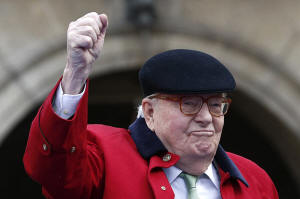Jean-Marie Le Pen, French far-right leader known for fiery rhetoric
against immigration, dies at 96
 Send a link to a friend
Send a link to a friend
 [January 08, 2025]
By THOMAS ADAMSON, SYLVIE CORBET and ELAINE GANLEY [January 08, 2025]
By THOMAS ADAMSON, SYLVIE CORBET and ELAINE GANLEY
PARIS (AP) — Jean-Marie Le Pen, the founder of France’s far-right
National Front who was known for fiery rhetoric against immigration and
multiculturalism that earned him both staunch supporters and widespread
condemnation, died Tuesday. He was 96.
One of the most polarizing figures in French politics, Le Pen made Islam
and Muslim immigrants his primary target, blaming them for economic and
social woes. He also repeatedly denied the Holocaust and was convicted
multiple times of antisemitism, discrimination and inciting racial
violence.
Despite those convictions and eventually being politically ostracized,
the nativist ideas that propelled his decades of popularity —
encapsulated in slogans like “French People First” — are ascendant in
today’s France, across Europe and beyond.
Le Pen — who reached the second round of the 2002 presidential election
that Jacques Chirac went on to win in a landslide — was eventually
estranged from his daughter Marine Le Pen. She renamed his National
Front party, ousted him and transformed it into one of France’s most
powerful political forces while distancing herself from her father.
Jordan Bardella, president of the National Rally, as the party is now
known, confirmed Le Pen’s death in a post on social media platform X.
Bardella’s unusually warm tribute described Le Pen as a “voice of the
people” who “always served France."
The post appeared to blur the boundary the rebranded party had sought to
establish between its firebrand founder and its more polished direction
under Marine Le Pen.

President Emmanuel Macron, a centrist, offered his condolences to Le
Pen's family and friends in an uncharacteristically short statement
issued by the presidential palace.
“A historic figure of the far right, he played a role in the public life
of our country for almost 70 years, which is now a matter for history to
judge,” the statement read.
Marine Le Pen, thousands of kilometers (miles) away in the French
territory of Mayotte, was inspecting the aftermath of destructive
Cyclone Chido when her father died.
His death came at a crucial time for his daughter. She is considered a
leading potential contender for the next presidential election in 2027,
if she’s not banned from running for office in an embezzlement case.
A former paratrooper and Foreign Legionnaire who fought to maintain
French colonial rule in Indochina and Algeria, Jean-Marie Le Pen was a
wily political strategist and gifted orator who used his charisma to
captivate crowds.
“If I advance, follow me; if I die, avenge me; if I shirk, kill me,” Le
Pen said at a 1990 party congress, reflecting the theatrical style that
for decades fed the fervor of followers.
The portly, silver-haired son of a Breton fisherman viewed himself as a
man with a mission — to keep France French under the banner of the
National Front.
His statements — including Holocaust denial, racist denunciations of
Muslims and immigrants, and a proposal to round up people with AIDS —
shocked his critics and strained his political alliances. Le Pen
routinely countered that he was simply a patriot protecting the identity
of “eternal France.”
Le Pen, who lost his left eye in 1965 while hammering a tent stake, for
years wore a black eye patch that became a symbol of his combative
persona. He was a constant force in French political life, impossible
for politicians on the left or right to ignore, and proved the spoiler
in election after election, forcing rivals to scramble to counter him.
Today, the National Rally, the successor to the party he founded, has
not only solidified its presence in French politics but also pushed
Macron to the right on security and immigration, reflecting a broader
shift in the political landscape.

Le Pen was repeatedly convicted for his remarks, notably in 1990 for a
comment made three years earlier in which he referred to the Nazi gas
chambers as a “detail in World War II history.” In 2015, he repeated the
remark, saying he “did not at all” regret it, triggering the ire of his
daughter — by then the party leader — and a new conviction in 2016.
He also was convicted for a 1988 remark linking in a play on words a
Cabinet minister with the Nazi crematory ovens, and for a 1989 comment
blaming the “Jewish international” for helping seed “this anti-national
spirit.”
Le Pen lost his European Parliament seat in 2002 for a year for
assaulting a Socialist politician during a 1997 election campaign.
[to top of second column]
|

Former far-right National Front party leader Jean-Marie Le Pen
clenches his fist at the statue of Joan of Arc, Monday May 1, 2017,
in Paris. (AP Photo/Kamil Zihnioglu, File)

More recently, Le Pen and 26 National Front officials, including his
daughters Marine and Yann Le Pen, have been accused of using money
destined for EU parliamentary aides to pay staff who instead did
political work for the party between 2004 and 2016, in violation of
the 27-nation bloc’s regulations.
Jean-Marie Le Pen was deemed unfit to testify and eventually
exempted from prosecution on health grounds.
He was born June 20, 1928, in the Brittany village of
Trinite-Sur-Mer. His father later died in World War II.
Le Pen was attracted early to the extreme right. After completing
law and political science degrees, he made his way to Paris, and at
27 became the youngest lawmaker in the National Assembly under the
banner of the Union for the Defense of Shopkeepers and Artisans.
In 1963, he and Leon Gaultier, who served in the Waffen SS under the
Nazis, founded a company, SERP, that churned out political
discourses. With the neo-fascist group New Order, Le Pen founded the
National Front on Oct. 5, 1972.
It would take more than a decade for the party to emerge as a
political force — in a September 1983 municipal election when
Jean-Pierre Stirbois won 16.7% of the votes in the town of Dreux,
west of Paris.
A year later, the party won enough votes in European parliamentary
elections to seat 10 legislators. The party’s entry as a force in
national politics came two years later in legislative elections that
gave Le Pen’s party 35 seats in France’s National Assembly.
By then, Le Pen had begun polishing his scrappy image.
In 1988, he startled the nation by taking 14% of the vote in the
first round of presidential elections. Fourteen years later, in his
fifth bid for the presidency, he outdid that — scoring 16.8% — and
reached the second-round runoff with Chirac.
France shuddered, Europe trembled and the National Front gloated.
But a Le Pen victory was not to be. In a rare joining of forces,
supporters of the right and left poured into the streets of France
in a massive show of solidarity against him. On May 5, 2002, Chirac
was returned to office with a record 82% of the vote.
His private life was tumultuous.
An explosion destroyed the family apartment building in 1976 but
injured neither Le Pen nor his wife or three children.

The French media relished recounting Le Pen’s divorce saga from
Pierrette Lalanne. In a reflection of that bitter separation, she
famously posed for Playboy in 1987, partly dressed in a risque
maid’s costume. The magazine quoted her as saying she was responding
to her husband’s Playboy interview in which he said she could become
a housekeeper if she needed money.
He married for a second time in 1991, to Jeanne-Marie Paschos, known
as Jany.
Le Pen began laying the groundwork for his succession at a party
congress in 2003, naming Marine — the youngest of his three
daughters — to the post of vice president. In 2011, she became party
president and in 2017 and 2022 reached the presidential runoff
herself. Both times she lost to the centrist Macron, but with a
shrinking margin.
Her softer style and attempts to distance the party from the most
extreme of his views soon brought her into conflict with her father.
His refusal to desist from antisemitic provocations clashed with her
bid to rid the National Front of its pariah status.
She removed him in 2015 and three years later stripped him of his
title of honorary president-for-life. A few months later, she
changed the National Front name to National Rally as part of her
strategy to renew the party’s image.
Her father called it the “toughest blow” the party had faced since
its founding.
Throughout his life, Jean-Marie Le Pen refused to cede or be
silenced.
“I’m a moral authority for the movement ... and I don’t have the
habit of keeping my opinions to myself,” Le Pen told AP in 2014.
___
Ganley, who retired from The Associated Press in 2024, contributed
to this report.
All contents © copyright 2024 Associated Press. All rights reserved |